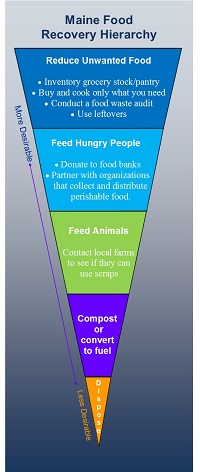Home → Sustainability → Composting
Composting
Organics can constitute over 40 percent of our solid waste stream, by weight. To encourage a reduction in the amount of food in the waste stream, Maine has adopted a Food Recovery Hierarchy that prioritizes the ways that food scraps and food waste can be reused. The goal of the hierarchy is to reduce the amount of food incinerated or disposed of in landfills. By reducing food waste, donating excess food, and implementing separation and recovery programs, these various organic materials can be captured and their value recovered through composting programs and the production of helpful soil amendment materials.
Many communities already have leaf and yard debris composting operations, which have been useful in diverting these organics from disposal at waste to energy facilities or landfills. Leaf composting programs can be readily expanded to accept other source separated organics, such as food scraps from residents, schools, cafeterias or restaurants. These food scraps are collected from the generators and delivered to a compost facility that is capable of receiving and composting these organics, which provides a source of nitrogen for the composting process and improves that biological activity. Department staff are available to assist local and regional efforts in developing or expanding programs that include waste reduction, reuse, recycling and composting programs.
For more information on composting, please contact Mark King at Mark.A.King@maine.gov or by calling him at 207-592-0455.
Additional Resources
- Solid Waste Diversion Grant Program
- Organics Recycling Overview
- Backyard composting
- Home composting
- Guide to Recovering and Composting Organics in Maine (PDF)
- The Maine Compost School (off site)
- 10 Steps: Starting a Successful School Composting Operation (PDF)
- Teacher Resources: Composting Curricula
- Consolidated Organics Collection
- Maine Environmental Guidance for the Cannabis Sector
